This Is How A Doctor Gets Rid Of An Annoying Cough In Minutes
"Hearst Magazines and Yahoo may earn commission or revenue on some items through these links."
There are few things in life more annoying than a pesky cough that just won’t go away. A cough could be a simple tickle in the throat, or it can linger after a bout of seasonal allergies or long after a cold has passed. Whatever the duration, the discomfort may have you wondering how to get rid of a cough in five minutes.
But TBH, a cough is not always a bad thing. Coughing is an important reflex that helps protect our airways and lungs against irritants like dust, germs, and mucus. And occasional coughing is completely normal, according to the American Lung Association.
That said, a cough isn’t necessarily something you should just shrug off. “[A] cough has many causes, ranging from a common viral illness to asthma or seasonal allergies to more significant health problems, such as chronic lung conditions, congestive heart failure, or even cancer,” says Michael Hanak, MD, an assistant professor of family medicine at Rush University Medical Center in Chicago.
Now, some people may develop a cough after dealing with a case of COVID. A COVD cough is dry and persistent, according to Sioux Falls Specialty Hospital. It is typically accompanied by other symptoms such as chest pains, fatigue, headaches, and shortness of breath.
Certain medications could also be to blame for that tickle in your throat, says Dr. Hanak. Environmental triggers like dust, mold, or other pollutants could also be a contributing factor, either through lung irritation or postnasal drip. Acid reflux can sometimes lead to a cough as well, he adds.
Dr. Hanak states that sometimes a prolonged cough can follow a common cold or other respiratory infection, even as other symptoms improve. “Persistent inflammation of the airways acts similar to bronchitis and can be managed with certain inhalers,” mentions Dr. Hanak.
Given that the causes of a cough can be something serious or benign, when should you see a doctor? “When a cough is present for more than two weeks, it is reasonable to contact a health care provider for additional testing or recommendations,” notes Dr. Hanak.
In the meantime, if you’ve just started hacking, you can try to soothe your throat with one of these remedies.
12 Ways to Get Rid of a Cough in Five Minutes
To find an effective cure, Dr. Hanak says you need to first find out what the most likely cause of your cough is, or at least pinpoint which one you are targeting first, and go from there.
#1 Salt Water Gargle
A super simple way to ease a common cough is by gargling with warm saltwater. It may help cut down the duration of certain cold symptoms like coughing, per a 2019 study. It can also kill bacteria, loosen up mucus, and ease pain, according to Penn Medicine.
To make one at home, you can mix half a teaspoon of table salt that’s already in your pantry with eight ounces of warm water.
#2 Ginger
Ginger is well known as a way to calm an upset stomach. Turns out it can also work wonders for a cough. “Ginger has been found to be helpful in reducing cough and alleviating sore throat, and ginger lozenges are widely used for this purpose,” Dr. Hanak explains. Ginger also has both anti-inflammatory and antioxidant properties that are helpful in treating a variety of conditions, he adds
#3 Heartburn Medications
Dr. Hanak says Pepcid, Prilosec, or other antacids can relieve acid reflux and nix any associated coughs.
Making certain dietary changes may also help, such as avoiding citrus, chocolate, high-fat foods, onions, and tomato-based food products and incorporating other high-fiber foods, like brown rice, celery, lettuce, melon, oatmeal, and root vegetables (think: potatoes).
You may also want to drink lots of water and keep your portions small at meals if your coughs are due to reflux, says Dr. Hanak.
#4 Honey
Coughing, but also craving something sweet? You are in luck! “Honey has been found to be helpful in alleviating cough, either on its own or as part of a cup of tea,” says Dr. Hanak. It can also temp down pain and fight off viral infections, according to Penn Medicine. Just add two tablespoons of honey to a mug of warm water or hot tea to reap these benefits.
#5 Hot Bath or Shower
One of the best ways to ease common cold symptoms like congestion, coughing, and sinus pressure is by taking a hot bath or shower. The humidity from the steam is great for opening your sinuses and thinning out your mucus, making it easier for your body to get rid of it.
You could also try a humidifier. Humidifiers can add moisture to the air around you.
#6 Hydrate
Hydration is important on any given day, but it can be especially crucial when you have a cough. “Staying well-hydrated can help thin mucus in the back of the throat, which can lead to mild improvement in a cough,” explains Dr. Hanak.
#7 Lozenges
Another quick and easy at-home remedy to stop a cough in its tracks? Reach for a lozenge or hard candy. Sucking on a lozenge or hard candy can stimulate saliva production, which increases secretions in the mouth and can in turn dampen any cough.
#8 Nasal Sprays
If your cough is a result of allergies, Dr. Hanak recommends using Flonase or Nasonex paired with a daily allergy pill such as Allegra, Claritin, or Zyrtec.
“Treating allergy symptoms is a common method of resolving post nasal drip and related cough,” he says. “This is especially true when a cough is most apparent laying flat or first thing in the morning. “
He also points out that a cough can be seasonal or year-round, so paying attention to the timing will allow you to predict and prevent it.
#9 Neti Pot
To tame a cough caused by a post nasal drip, Dr. Hanak suggests using a neti pot. “Clearing mucus from the nasal passages can be helpful in reducing post nasal drainage, thereby improving cough,” he explains.
#10 Over-the-Counter Medications
While rummaging around in your medicine cabinet, you may also want to look for some OTC medications. Antitussives are cough suppressants and can block the cough reflex, according to the American Academy of Family Physicians. Then there are expectorants, which thin mucus and may help your cough expel the mucus from your airway.
When in doubt, ask your pharmacist or primary care physician, and always remember to check the expiration dates.
#11 Probiotics
Probiotics can promote good gut health, but Dr. Hanak says they have also been shown to have a marginal impact on staving off the common cold and reducing symptoms, including coughing.
#12 Quit Smoking
By minimizing exposure to chemicals and irritants, which are harmful to the lungs, Dr. Hanak says quitting smoking can cut down on inflammation. A cough from smoking can be progressive, depending on how much someone smokes and how long they have been smoking, he adds.
When it comes to cold or COVID symptoms, there's something about a cough that can be extra frustrating. A cough is uncomfortable, yes, but it can also be disruptive when it just won't quit. If you can currently relate, you might be searching for ways to get rid of a cough in five minutes, and I don’t blame you.
But just so you know, a cough isn’t always bad, it’s a reflex that protects our airways and lungs against irritants like dust, germs, and mucus. And occasional coughing is completely normal, according to the American Lung Association.
That said, a cough isn’t necessarily something you should just shrug off. “[A] cough has many causes, ranging from a common viral illness to asthma or seasonal allergies to more significant health problems, such as chronic lung conditions, congestive heart failure, or even cancer,” says Michael Hanak, MD, an assistant professor of family medicine at Rush University Medical Center in Chicago. Now, some people may develop a cough after becoming infected with COVID-19. A COVID cough is dry and persistent, according to Sioux Falls Specialty Hospital. It is typically accompanied by other symptoms such as chest pains, fatigue, headaches, and shortness of breath.
Meet the experts: Michael Hanak, MD, is an assistant professor of family medicine at Rush University Medical Center in Chicago. Keri Peterson, MD, is an internal medicine doctor and WH advisor.
However, there are also less serious causes of coughing. Certain medications could be to blame, says Dr. Hanak. Environmental triggers like dust, mold, or other pollutants could be a contributing factor as well, either through lung irritation or postnasal drip. Acid reflux is another potential trigger.
If you've been coughing for more than two weeks, Dr. Hanak suggests seeing your doctor for additional testing or recommendations. But if you’ve just started hacking, you can try to soothe your throat with these remedies.
Gargle With Salt Water
A simple way to ease a cough is with salt water. "Salt can kill bacteria," says Keri Peterson, MD, an internal medicine doctor and WH advisor. "It's also soothing." However, salt doesn't kill viruses, so it may not help you heal your cold or cough faster, Dr. Peterson explains.
To try this at home, mix half a teaspoon of table salt with eight ounces of warm water.
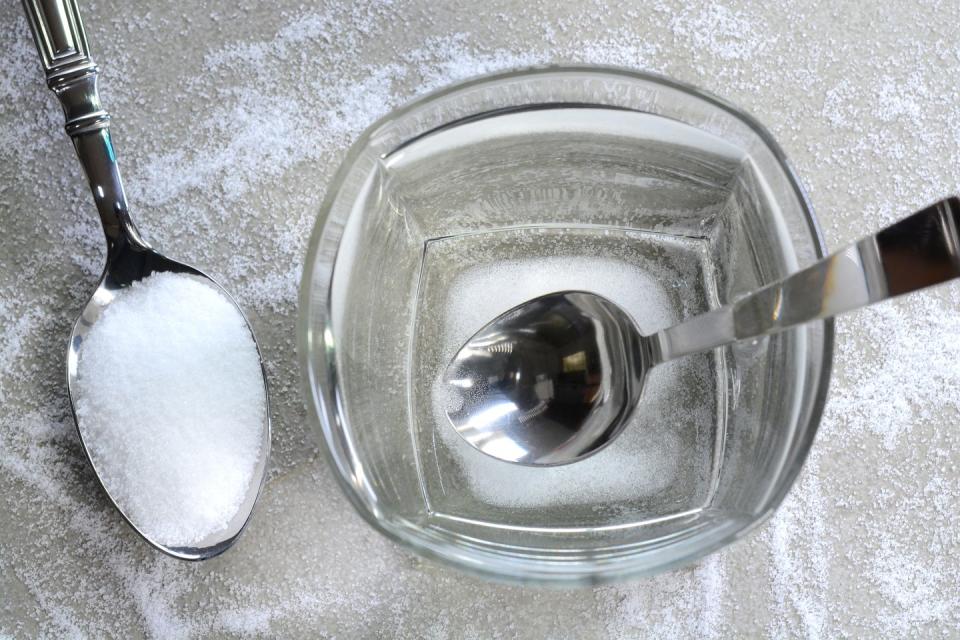
Sip On Ginger Tea
Ginger is well known for its power in calming an upset stomach. Turns out, it can also work wonders for a cough.
“Ginger has been found to be helpful in reducing cough and alleviating sore throat, and ginger lozenges are widely used for this purpose,” Dr. Hanak explains.
The root also has anti-inflammatory and antioxidant properties that are beneficial in treating a variety of conditions, he adds. Brew some ginger tea by using a teabag or pouring hot water over some fresh slices.
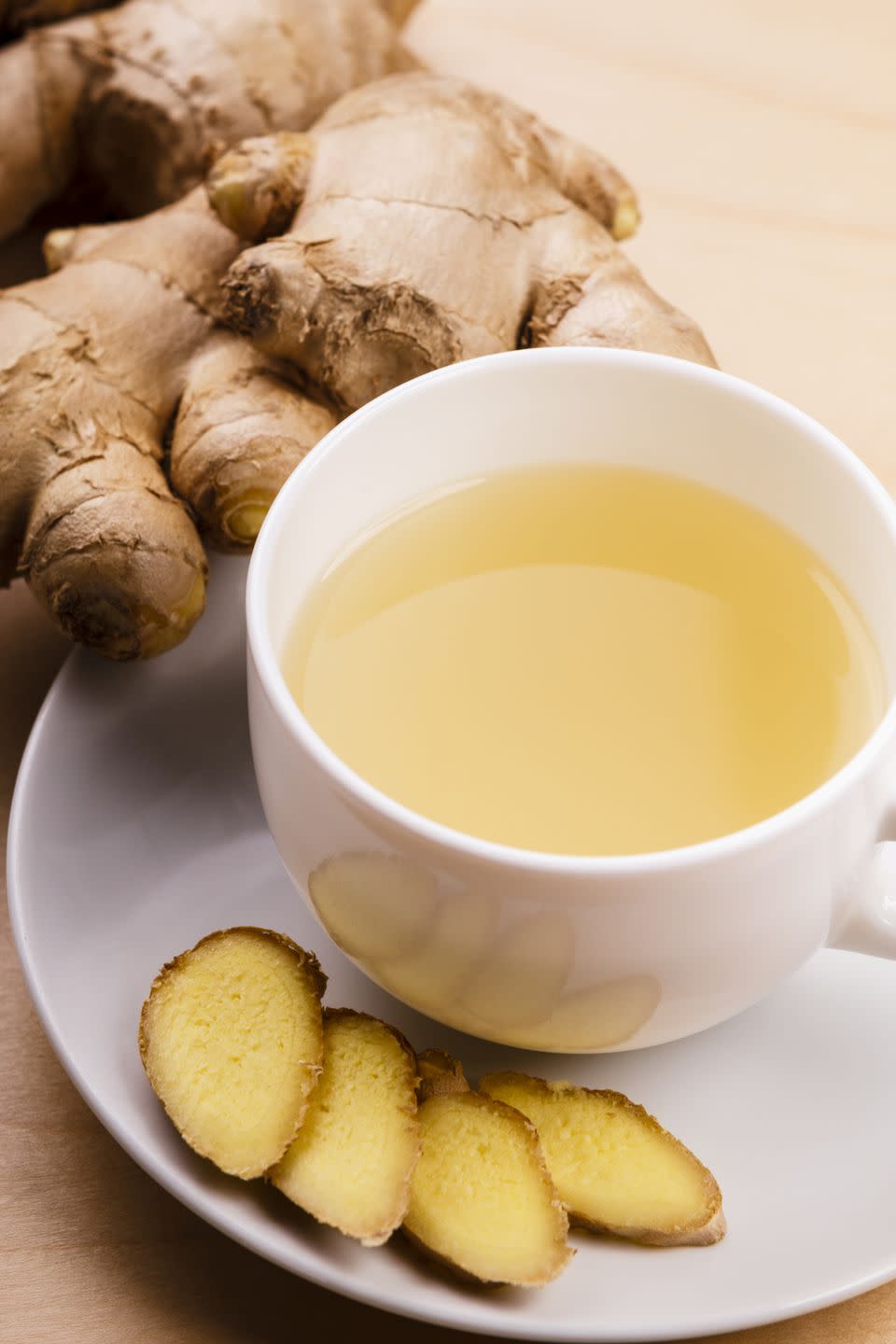
Consider Heartburn Meds
Pepcid, Prilosec, or other antacids can relieve acid reflux and nix any associated coughs, notes Dr. Hanak.
If you find it to be a chronic issue, making certain dietary changes may help, such as avoiding citrus, chocolate, high-fat foods, onions, and tomato-based food products, and incorporating high-fiber foods into your diet, like brown rice, celery, lettuce, melon, oatmeal, and root vegetables (think: potatoes).
You may also want to drink lots of water and keep your portions small at meals if your coughs are due to reflux, says Dr. Hanak.
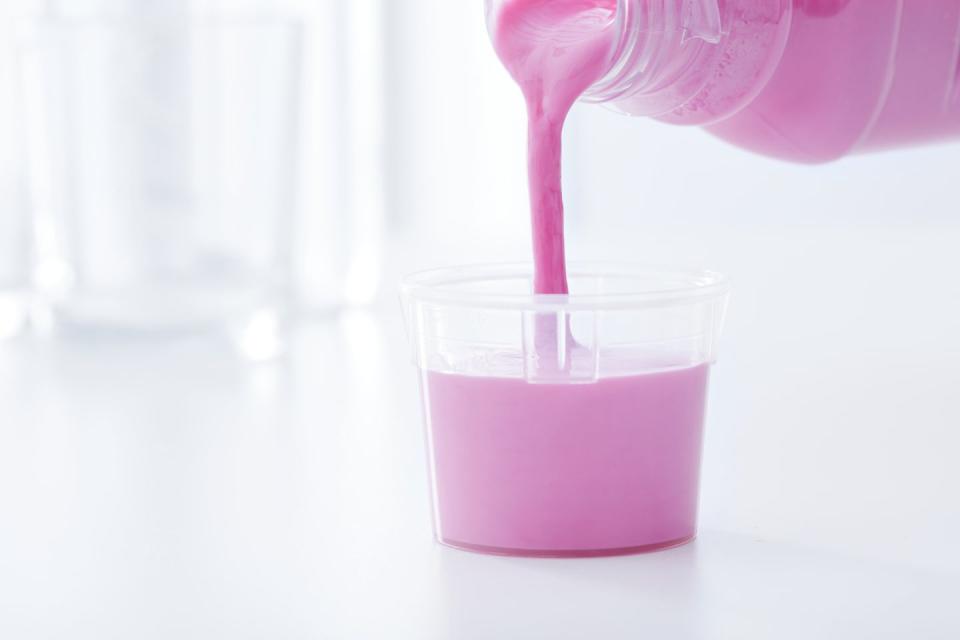
Add Honey To Your Drinks
Coughing, but also craving something sweet? You're in luck! “Honey has been found to be helpful in alleviating cough, either on its own or as part of a cup of tea,” says Dr. Hanak. In fact, honey might relieve cough symptoms better than no treatment, diphenhydramine, and a placebo, a 2018 study found.
It's soothing to the upper airways, taking that throat tickle away, Dr. Peterson adds. "It's also anti-inflammatory so it helps with inflammation—honey's great."
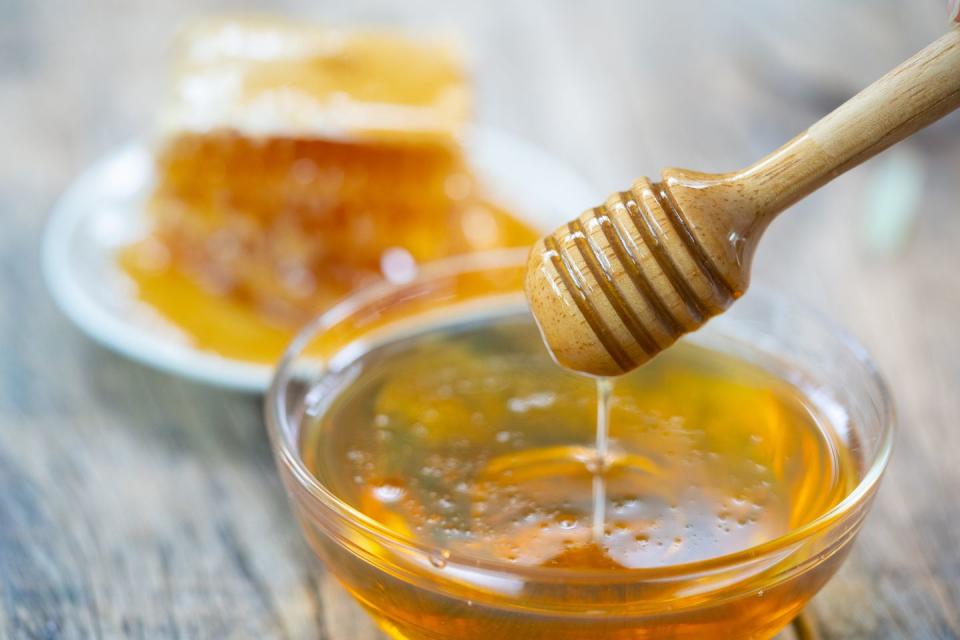
Enjoy A Hot Bath Or Shower
Besides helping you de-stress after a long day, soaking in a hot bath can ease common cold symptoms like congestion, coughing, and sinus pressure, says Dr. Peterson. (A shower works just as well, FYI.) "The steam opens up the airways really well and it soothes," she says.
Alternatively, you could try a humidifier, which adds moisture to the air around you and can work in the same way.

Hydrate
Hydration is important on any given day, but it can be especially crucial when you have a cough. “Staying well-hydrated can help thin mucus in the back of the throat, which can lead to mild improvement in a cough,” explains Dr. Hanak.

Grab A Lozenge
Another quick and easy at-home remedy to stop a cough in its tracks? A lozenge, like Ricola lemon mint drops, says Dr. Peterson.
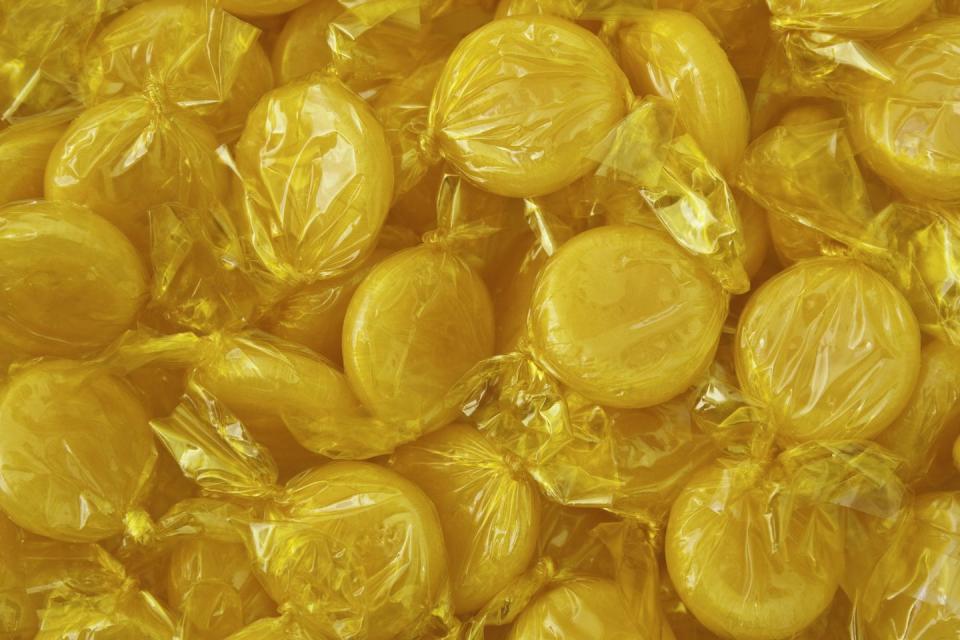
Try A Nasal Spray
If your cough is a result of allergies, try Flonase or Nasonex paired with a daily allergy pill such as Allegra, Claritin, or Zyrtec, per Dr. Hanak.
"Treating allergy symptoms is a common method of resolving postnasal drip and related cough," he says. "This is especially true when a cough is most apparent laying flat or first thing in the morning."
A cough can be seasonal or year-round, so paying attention to the timing will allow you to predict and prevent it, he adds.

Use A Neti Pot
To tame a cough caused by a postnasal drip, Dr. Hanak and Dr. Peterson suggest using a neti pot, which can wash out any debris or mucus from your nasal passages. “Clearing mucus from the nasal passages can be helpful in reducing post nasal drainage, thereby improving cough,” Dr. Hanak explains.
This irrigation device can provide relief for people with allergies and sinus infections, in particular, and Dr. Peterson uses one herself. "They flush out germs, the salt kills the bacteria," she says.
But remember to use a neti pot with sterile water to make sure there's no bacteria or other contaminants in it. To ensure it's safe, boil water and refrigerate it or buy distilled water, Dr. Peterson says.
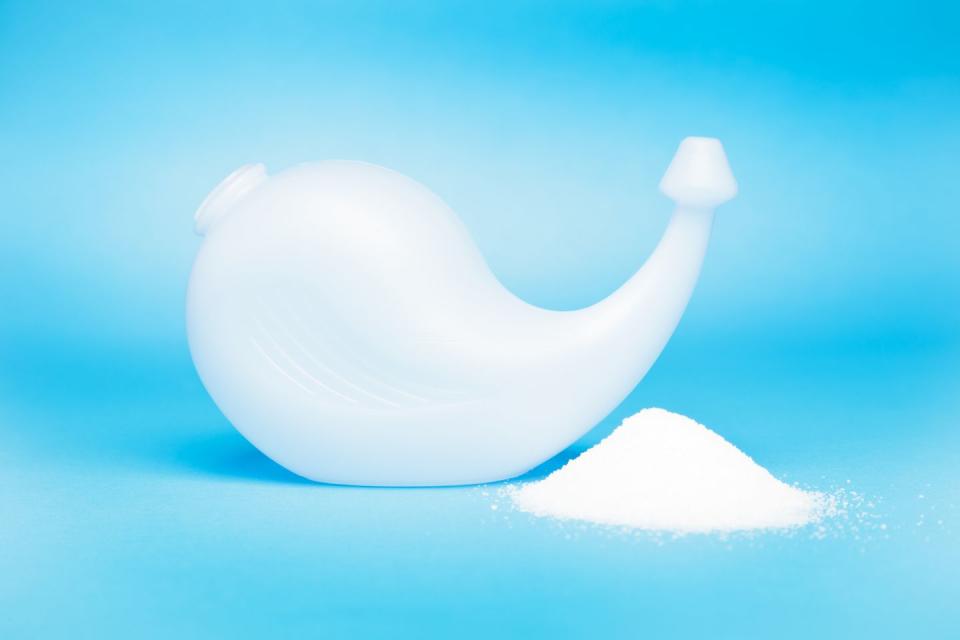
Pick Up Cough Medicines
You also may want to give OTC medications a shot, especially if you've already tried everything else. Antitussives are cough suppressants and can block the cough reflex, according to the American Academy of Family Physicians. They "inhibit the cough center in the brain," Dr. Peterson adds. Then there are expectorants, which thin mucus to help get it out, she says.
When in doubt, ask your pharmacist or primary care physician, and always remember to check the expiration dates. Dr. Peterson recommends Delsym and Mucinex DM.

Get A Prescription Medication
When in doubt, talk to your doc and see if you might need something stronger, like a prescription medication, for your cough. Benzonatate medications like Tessalon Perles, are specifically recommended by Dr. Peterson, but of course your own doctor will prescribe what's right for you. Benzonatate "anesthetizes the stretch receptors of the nerves in the airways and works very well to suppress coughs," she explains.

Eat Your Probiotics
Probiotics can promote good gut health, but they have also been shown to have a marginal impact on staving off the common cold and reducing coughing, Dr. Hanak says. Great sources of probiotics include yogurt and fermented foods like miso and kimchi.
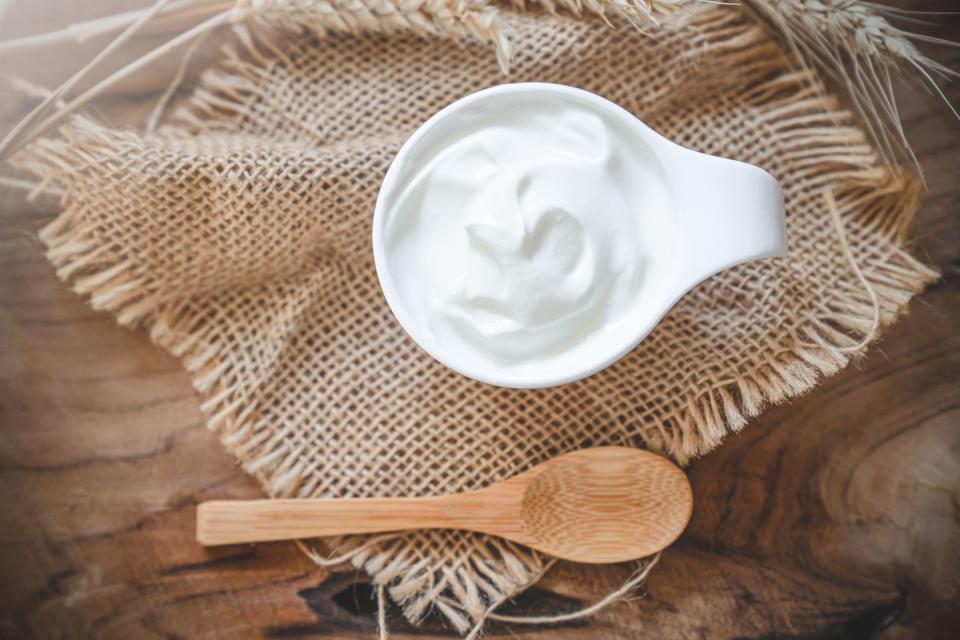
Quit Smoking
By minimizing exposure to chemicals and irritants, which are harmful to the lungs, quitting smoking can cut down on inflammation, Dr. Hanak says. A cough caused by smoking can be progressive, depending on how much someone smokes and how long they have been smoking, he adds.

Consider A Chloraseptic Throat Spray
Chloraseptic throat spray can provide temporary relief for pain, irritation, and soreness in the throat, per Dr. Peterson. "It's instant," she says. "You spray it on, it works immediately, and so it takes away the tickle in the back of the throat."

Try Throat Coat Tea
Throat coat tea has licorice and slippery elm, which is licorice-based, and it almost, well, coats the throat, creating a barrier to soothe inflammation, making it a great option for a nagging cough, says Dr. Peterson who sips on the tea daily herself.

When To See A Doctor
Again, if you've had a persistent cough for more than two weeks, Dr. Hanak says to contact your healthcare provider. Other signs to call your doctor for a cough include shortness of breath, wheezing, high fever, chest pain, and hemoptysis (coughing up blood), per Dr. Peterson.

You Might Also Like

